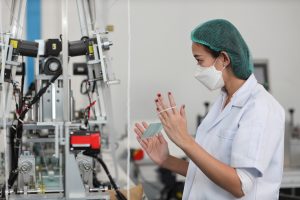Every job has benefits and drawbacks.
Keep that in mind as we look through the pros and cons of a job in sterile processing.
A sterile processing technician focuses on cleaning and sterilizing medical equipment and tools, preventing infections and the spread of diseases.
As altruistic as that sounds, it’s important to keep in mind the things you might not know about being a sterile processing tech we review in this list.
Furthermore, note that some of the pros can also be cons and vice versa.
For example, if you don’t want to sit at a desk all day, having a standing job might be right up your alley.
Others might know that a lot of standing could exacerbate a health issue.
Pros of Being a Sterile Processing Technician
1. Quick Entry Into the Field
While it’s not an easy job to get necessarily, it’s a healthcare job that requires limited education, much less than a college degree, as you might otherwise expect in a healthcare position.
In fact, some education courses I’ve researched show that anyone 16 and old with a high school degree or equivalent can take certification courses.
If, by desire or necessity, you want to get into the workforce ASAP, this is a great path to start with.
2. Job Stability of Essential Worker
We all saw how important sanitizing was during the pandemic.
As essential workers in healthcare, sterile processing techs enjoy strong job stability due to the critical nature of their role in maintaining patient safety and infection control.
The demand for sterile processing techs remains consistently high, as surgery and medical procedures cannot proceed without properly sterilized instruments.
Even during economic downturns or public health crises, these positions are less likely to face layoffs or reduced hours, making it a reliable career choice with steady employment opportunities.
3. Job Satisfaction
Even as I researched this topic, looking for the pros and cons of being a sterile processing technician, one sentiment rang consistently true–these people generally love their job and the importance of their role.
Not to get too far ahead, the only drawback was if someone was in a toxic work environment or didn’t have good management.
However, you can weed out those facilities by doing research before accepting a position.
Also, dealing with those challenges could inspire you to move into management later in your career.
4. Positions in Demand
Even with the need for sterile processing technicians in the future, you should also look at the various healthcare environments from which to choose.
There are dental officers, surgery centers, hospitals, plastic surgery, and other specialized niche industries in the field.
Also, take a moment to look for sterile processing technician jobs on the internet and read these tips for finding a job as sterile processing tech.
You’ll see pages of jobs posted across the country.
5. Career Transition Potential
We’ll talk in a bit about the salary limitations of the position, but on the flip side, there’s a lot of potential to advance in the healthcare industry.
For example, being a sterile processing technician is a great pathway to becoming a surgical tech.
You can also get a taste of the medical industry and get additional education to become a nurse if it really ignites a passion for the work.
Management positions are also one of the most in-demand jobs of the future, and having that hands-on experience will pay off big time if that’s the path for you.
6. Flexible Hours
Not everyone is designed to handle Monday–Friday, 8am–5pm.
If you need to work evening hours to accommodate a family situation or prefer to work in the relative quiet of the overnight shift while still getting home to get the kids to school, this is one job that rarely comes with set hours.
Plus, some jobs come with 10 to 12-hour shifts, offering more days off during the week.
Then there’s the overtime potential, which could put more money in your bank account throughout the year.
7. You Know What You’re Wearing to Work Each Day
Instead of pouring through your closet for a new outfit, you know the clothing of the day will be scrubs.
In addition, scrubs and personal protection equipment like gloves and a bouffant cap are usually provided by the employer.
That also means your workplace will do the laundry for scrubs to keep them in a sterile environment.
8. You Can Travel for Work
Last but certainly not least, the potential to travel to different states or countries as a sterile processing tech is a significant pro.
It offers a double benefit of breaking up the monotony of the position.
Travel contracts and temporary assignments can pay up to $50 an hour with travel costs covered.
Plus, most travel companies pay weekly.
If you look through Reddit’s r/sterileprocessing forum, you’ll see many people in the position are just waiting for the right opportunity to transition from a localized job to a travel position.
Cons of Being a Sterile Processing Technician
1. It’s a Stressful Job
Probably the biggest complaint or concern I’ve heard from sterile processing techs is how stressful and demanding the job is.
Since cutting corners or rushing work could impact patient safety, back-to-back surgeries, emergencies, or staffing shortages, don’t change how long it takes to do the job correctly.
The added pressure can really be taxing on mental and emotional health.
2. Standing All Day
Barring necessary reasonable accommodations, sterile processing technicians stand all day disassembling, cleaning, and sterilizing tools.
Having comfortable, supportive shoes will only go so far.
On a busy day, there might not be a lot of opportunities to sit down.
On top of that, you could be lifting things that are 25 to 40 pounds throughout your shift or pushing/pulling heavy carts.
3. Wear Personal Protective Equipment
Wearing PPE all day is a significant downside for some sterile processing techs, as it can be uncomfortable and exhausting.
Constant use of gloves, masks, gowns, and face shields can lead to heat, sweating, and restricted movement, making it difficult to stay comfortable and focused.
4. Repetitive Motions
Everyone knows that typing all day can lead to carpal tunnel if proper adjustments aren’t made, and similarly, the repetitive motions of cleaning and sterilizing equipment could cause pain or discomfort.
The long-term effects of repetitive motions for sterile processing techs can include chronic pain, joint stiffness, and repetitive strain injuries such as tendonitis or carpal tunnel syndrome.
Over time, these conditions can lead to reduced mobility, persistent discomfort, and additional treatment costs.
5. You Might Get Bored
The repetitive nature can also breed monotony and boredom, especially as you settle into the position.
Most people think working in healthcare will mean a “new day” every day with new challenges and cases.
However, the sterile processing landscape is “by the book.”
The monotony of doing the same motions over and over to meet standards and requirements might not be the intellectually stimulating career path you imagined.
6. The Hours Might Not be Ideal
Especially early in a sterile processing tech career, the hours could include weekends, overnights, evenings, or early mornings.
Staffing challenges could mean excessive overtime, especially during holidays or busy times of the year.
Not everyone is suited to perform optimally during swing shifts or overnight shifts.
It could also parlay into an impact on your personal life since you’ll need to get a healthy amount of rest to stay detail-oriented at work.
7. The Salary Ceiling
The bonus of minimal education requirements for the position catches up with you when you realize that there’s a limit to how much a sterile processing technician gets paid.
While the Bureau of Labor Statistics does show the demand for the job will extend to the next decade and beyond, the salary range is from $16.36 an hour to $30.76 an hour.
Once someone hits the high end of that range, the only way to make more would be to go into management or learn a new healthcare industry niche.
8. Certification Requirements
While only a handful of states currently require certification for sterile processing technicians, each healthcare employer will have a set of requirements.
More often than not, being certified or getting certified within the first year is required.
Then, certifications are required every five years.
Failing a certification exam could leave you unemployed or on hiatus until the next chance to pass the exam.
Pros and Cons of Being a Sterile Processing Technician – Summary Table
| Pros of Being a Sterile Processing Technician | Cons of Being a Sterile Processing Technician |
|---|---|
| 1. Quick Entry Into the Field | 1. It’s a Stressful Job |
| 2. Job Stability of Essential Worker | 2. Standing All Day |
| 3. Job Satisfaction | 3. Wear Personal Protective Equipment |
| 4. Positions in Demand | 4. Repetitive Motions |
| 5. Career Transition Potential | 5. You Might Get Bored |
| 6. Flexible Hours | 6. The Hours Might Not be Ideal |
| 7. You Know What You’re Wearing to Work Each Day | 7. The Salary Ceiling |
| 8. You Can Travel for Work | 8. Certification Requirements |
Should You Become a Sterile Processing Technician?
Once you’ve weighed the pros and cons of becoming a sterile processing technician, you can judge how well you’ll be able to handle the best days and the most challenging days.
If you want one of the fastest paths into an important medical field, sterile processing is a good choice that also comes with the self-satisfaction of positively contributing to the safety of other people.
Plus, the job will always be in demand.
That’s in spite of the fact that some people don’t think the salary is commensurate with the responsibility of the job.
Whether you plan to stay in the field or use it as a stepping stone to a more advanced medical field, the sterile processing technician experience will always pay off in the long run.
This page is also available in Spanish.










